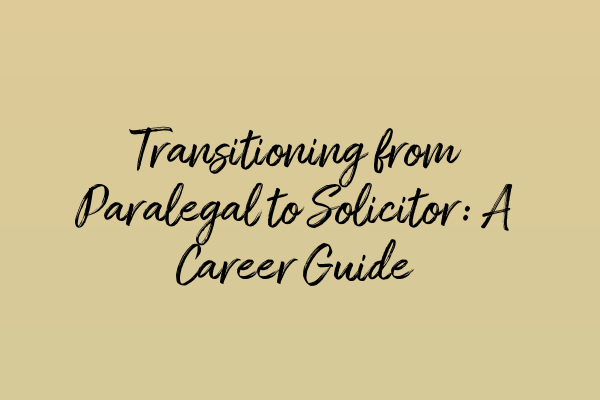Transitioning from Paralegal to Solicitor: A Career Guide
Are you a paralegal looking to take the next step in your career and become a solicitor? Transitioning from a paralegal to a solicitor can be an exciting and challenging journey. In this career guide, we will explore the necessary steps and provide valuable insights to help you make a smooth transition. So, let’s dive right in!
1. Understand the Solicitor Qualification Process
The first step in transitioning from a paralegal to a solicitor is to understand the solicitor qualification process. The Solicitors Regulation Authority (SRA) sets out the requirements and regulations for becoming a solicitor in the UK. It is essential to familiarize yourself with the SRA’s guidelines to ensure you are on the right track.
If you want to learn more about the solicitor qualification process, check out our related article on Demystifying Criminal Law Procedures: A Step-by-Step Guide. It provides an in-depth overview of the overall process.
2. Obtain the Necessary Qualifications
To become a solicitor, you need to obtain the necessary qualifications. This typically includes completing a qualifying law degree or an alternate route such as the Graduate Diploma in Law (GDL). Additionally, you will need to pass the Legal Practice Course (LPC) and secure a training contract with a law firm.
If you are interested in private prosecutions, our related article on Private Prosecutions: Exploring Non-Governmental Prosecutions in Criminal Cases might be of interest to you. It delves into the world of non-governmental prosecutions and offers valuable insights into this area of criminal law.
3. Gain Practical Experience
Practical experience is crucial when transitioning from a paralegal to a solicitor. While working as a paralegal, try to gain as much hands-on experience as possible. Take advantage of any opportunities to work on legal cases, attend court hearings, and assist solicitors with their workload. This will not only enhance your skills but also increase your chances of securing a training contract.
If you want to learn more about the key differences between magistrates’ court and crown court, our related article on Magistrates’ Court vs Crown Court: Understanding Key Differences provides a comprehensive comparison. Understanding these differences is essential for a successful career in criminal law.
4. Network and Build Connections
Networking plays a significant role in transitioning from paralegal to solicitor. Attend legal events, join professional organizations, and connect with solicitors in your field of interest. Building strong professional connections can open doors to potential job opportunities and provide valuable guidance throughout your career.
Are you interested in criminal law and want to learn more about protecting vulnerable witnesses in criminal trials? Check out our related article on Protecting Vulnerable Witnesses in Criminal Trials: Best Practices and Legal Safeguards. It offers insights into best practices and legal safeguards for vulnerable witnesses.
5. Apply for a Training Contract
A training contract is a crucial step towards becoming a solicitor. It provides you with the opportunity to gain practical experience and apply the knowledge obtained during your studies. Research law firms that offer training contracts and tailor your applications to showcase your skills and commitment to the legal profession.
To ensure you are well-prepared for your transition, it is vital to understand the rights of the accused in criminal proceedings. Our related article on Rights of the Accused: Protecting Individual Liberties in Criminal Proceedings provides an overview of the rights and safeguards that must be upheld throughout the criminal justice process.
Conclusion
Transitioning from a paralegal to a solicitor is an exciting and rewarding career move. By understanding the solicitor qualification process, obtaining the necessary qualifications, gaining practical experience, networking, and securing a training contract, you can pave the way for a successful career as a solicitor.
Remember, this is just a guide to give you an overview of the steps involved. Each individual’s journey may differ, so it’s important to tailor your approach based on your personal circumstances and goals. Good luck!


Leave a Reply